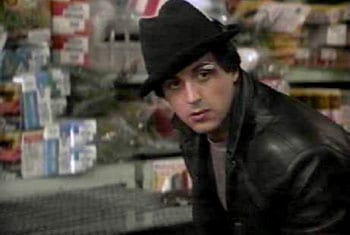When you go back to the original film, you realize that “Rocky” was actually intelligent and involving before he became a caricature. The 1976 Best Picture Oscar Winner written by then unknown Sylvester Stallone can be seen as a companion piece to an earlier classic, Elia Kazan’s “On the Waterfront”, with which it shares a few themes. Both movies are about a working class slob who had the potential to become a top boxer, but took the easy way, choosing to screw around with local thugs to make a quick buck. And then there’s Stallone the actor who’s surprisingly intense in his first major role, and could actually stand the comparison to Waterfront’s Marlon Brando. Like the great Method actor, Stallone exudes strong, almost animal virility. His Rocky Balboa is an absolutely unforgettable character which you’d want to follow everywhere. Poor, lonely and disillusioned, he earns a lousy living by boxing chumps in seedy clubs and by roughing up bad clients for a loan shark. But from the mean streets of Philadelphia, the city of Brotherly Love, Balboa remains hopeful. This is America after all, the place where everyone can get a chance to shine if he makes the effort.
Because Rocky is as American a film as it gets, but in a good sense. The original movie is free of Hollywood glitz; it actually owes more to its contemporary 70s gritty flicks. The film is patriotic and seems to believe in the American Dream, but it’s not blind to the darker sides of life in the US. Rocky hangs with the bitter Paulie (Burt Young), who’s convinced he’s being shortchanged by everyone and by life itself. Rocky too is not that much in admiration towards the state of the nation, and even when he gets his big dare to be great opportunity, it’s not all bright and sunny. Balboa learns that he’s been picked by Boxing World Champion Apollo Creed (the very charismatic Carl Weathers), a Muhammad Ali-style arrogant loudmouth. That fight which will take place on the Bicentennial of the American Independence is made to sound like it’s Creed’s way to show how America and him are ready to give a chance to a nobody like Balboa. But we see that Creed’s concerns are mostly centered around money and hype.
One of the greatest qualities of the film is how rich it is. Stallone’s screenplay studies the Rocky character, weaves an interesting plot, explores relevant themes, and sets up the exciting big fight. It even finds time for a sincere, poignant romance, as Rocky tries to woo Paulie’s timid sister Adrian (Talia Shire). These quieter scenes are particularly good; for instance, their first kiss is one of the most perfectly toned and executed scenes of the kind I’ve seen. Director John Avildsen made sure his film never even approached phoniness. “Rocky” always stays true to its characters, and it’s quite an admirable feat. And then there’s the legendary Bill Conti theme music, with its wah-wah guitars, brass lines and bongos which give the climactic scenes immense impact. “Rocky” is a real crowd-pleaser, not because it manipulates the audience but because it has heart.

